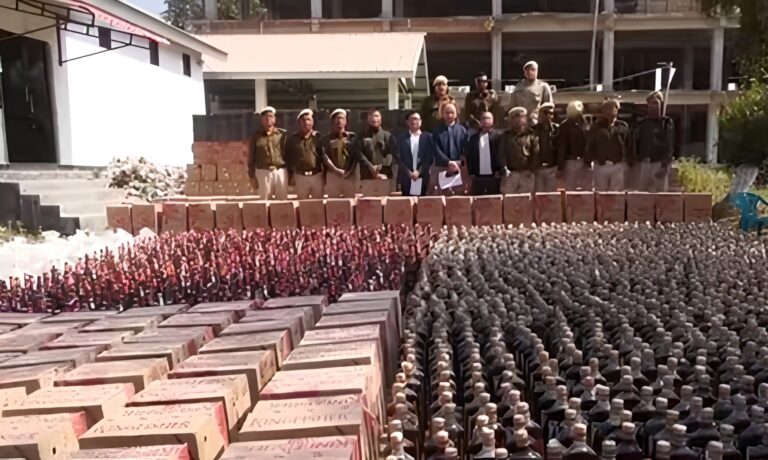Manipur Police Detain Suspected Extortionist with Militant Links in Bishnupur Operation
In a recent operation, Manipur’s Bishnupur District Police apprehended Pukhrambam Prem Singh, alias Hopson, a 47-year-old resident of Ningthoukhong Ward No. 13. Singh confessed to joining the proscribed group RPF/PLA in 1998 and undergoing military training in Myanmar. He admitted to extorting money from the public and government officials in Nambol, Bishnupur, and Ningthoukhong areas, collecting a total of ₹1,20,000 in September 2024. Authorities seized three mobile phones, ₹320 in cash, and various personal items during the operation. Singh and the seized items have been handed over to Bishnupur Police Station for further legal action.
Unmasking the Shadows: Manipur’s Battle Against Extortion and Militancy
Hey there! Let’s dive into a pressing issue that’s been making waves in Manipur recently. Imagine living in a place where shadowy figures lurk, demanding money and instilling fear. Sounds like a plot from a thriller, right? Unfortunately, for many in Manipur, this is a stark reality.
The Recent Bust: A Closer Look
Just the other day, the Bishnupur District Police, acting on a tip-off, conducted a dawn raid in Ningthoukhong. Picture this: it’s barely sunrise, and officers are gearing up, ready to swoop in. Their target? A man named Pukhrambam Prem Singh, though folks around know him as Hopson. At 47, instead of planning for a peaceful life, he’s entangled in a web of militancy and crime.
Back in 1998, Singh took a dark turn by joining the banned outfit RPF/PLA. He even traveled to Myanmar for six months of military training. Fast forward to recent times, and he’s been busy extorting money from locals and government officials in areas like Nambol, Bishnupur, and Ningthoukhong. In just September 2024, he managed to rake in ₹1,20,000 through these illicit activities. When the cops nabbed him, they found three mobile phones, a bit of cash, and some personal items. Now, Singh is cooling his heels at the Bishnupur Police Station, awaiting his fate.
A Broader Issue: The Menace of Extortion in Manipur
Singh’s arrest isn’t an isolated incident. It’s like pulling a thread and realizing it’s part of a much larger tapestry. Manipur has been grappling with a surge of extortion activities, many linked to various militant groups. These aren’t just petty criminals; they’re organized, strategic, and deeply entrenched.
For instance, in January 2025, security forces arrested two members of the banned Kangleipak Communist Party (KCP) in the Langmeidong area. These individuals were actively extorting money from residents in Kakching district. Similarly, in November 2024, six individuals from the Meitei community were reportedly abducted by suspected militants in Jiribam district, highlighting the escalating tensions and lawlessness in certain regions.
The Modus Operandi: How Do They Operate?
You might wonder, how do these extortionists operate? It’s not as dramatic as in the movies, but it’s equally sinister. Typically, they identify potential targets—often business owners, government officials, or affluent individuals. Then come the threats, either directly or through ominous letters and phone calls. The message is clear: pay up or face dire consequences.
In some cases, these groups justify their actions under the guise of fundraising for their ’cause.’ But let’s call a spade a spade—it’s coercion, plain and simple. And the victims? They’re left with a harrowing choice: comply and lose hard-earned money or resist and risk personal safety.
The Ripple Effect: Impact on Society
The impact of these activities is far-reaching. Beyond the immediate financial loss, there’s a pervasive sense of fear and insecurity. Businesses hesitate to invest or expand, stunting economic growth. Social trust erodes as neighbors become suspicious of each other’s affiliations. It’s like a dark cloud hovering over the community, dampening spirits and aspirations.
Law Enforcement’s Response: Fighting Back
But it’s not all doom and gloom. Manipur’s law enforcement agencies are stepping up their game. The recent arrest of Singh is a testament to their commitment. They’re enhancing intelligence networks, conducting regular raids, and fostering community relationships to encourage information sharing.
In January 2025 alone, security forces arrested eight militants linked to different proscribed groups across the state. These operations led to the seizure of arms, ammunition, and incriminating documents, delivering a significant blow to the militants’ operational capabilities.
Community Involvement: A Key Component
However, the police can’t do it alone. Community involvement is crucial. Residents are encouraged to stay vigilant, report suspicious activities, and support each other. It’s like reinforcing the walls of a fortress—each brick (or person) plays a part in keeping the structure (or community) strong.
Educational programs and awareness campaigns can also play a role in dissuading youths from joining these groups. By providing alternative avenues for growth and development, the allure of militancy can be diminished.
Looking Ahead: Hope on the Horizon
While challenges remain, there’s hope. With continued efforts from law enforcement and active participation from the community, Manipur can aspire to a future where such threats are relics of the past. It’s a journey, much like navigating a winding mountain road, but with perseverance and unity, the destination—a peaceful, thriving Manipur—is within reach.
FAQs
- What is the RPF/PLA?
- The Revolutionary People’s Front (RPF) and its armed wing, the People’s Liberation Army (PLA), are proscribed militant organizations in Manipur, aiming for an independent state separate from India.
- How do militant groups fund their activities?
- Many resort to extortion, targeting businesses, government officials, and affluent individuals to finance their operations.
- Is extortion limited to certain areas in Manipur?
- While some regions report higher incidences, extortion activities have been noted across various parts of the state, affecting both urban and rural communities.
- How can residents protect themselves from extortion threats?
- Staying vigilant, promptly reporting suspicious activities to authorities, and fostering strong community ties can help deter extortionists.
- What measures are being taken to rehabilitate former militants?
- The government has initiated surrender and rehabilitation programs, offering incentives like financial assistance, skill development, and employment opportunities to encourage militants to reintegrate into society.


